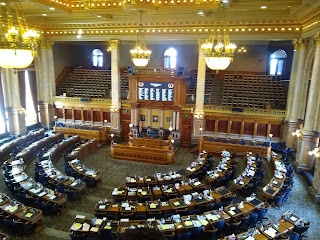| Iowa House Speaker Pat Grassley (R-Hartford); from iowa.gov |
Legislative session number nine of unified Republican control of Iowa state government ended about the way the first eight did: tax and service cuts, repressing groups they don't like, and full-throated support for whatever President Donald Trump is advocating today. Speaker Pat Grassley posted on Facebook that Iowa voters "send us to Des Moines to be your voice and to do hard things. The session was nothing short of working hard and continuing to do the hard things."
The hard things included some new laws with arguably laudable objectives. Late in the session, Speaker Grassley bragged on resolving conflicts over use of eminent domain to acquire land for a carbon capture pipeline; raising minimum K-12 teacher salaries; and banning student cellphone use in classrooms. Increased funding for community colleges supports a critical service. Requiring cities and counties to allow accessory dwelling units under certain conditions is one approach to providing affordable housing (Strong Towns 2025).
Yet the legislature also spent time on:
- banning drone surveillance of farms
- reducing unemployment insurance tax rates on businesses
- established quotas for Iowa residents in admission to medical and dental residency programs
- expanded work requirements for Medicaid
- removing gender identity from the Iowa Civil Rights Act
- removing perceived traits from the official definition of bullying
- prohibiting diversity, equity and inclusion positions in community colleges and local government
- barring use of Medicaid funds for gender dysphoria procedures and therapies
- lowering the legal age to purchase a handgun from 21 to 18
- barring sex offenders from serving as firefighters
- requiring voters to verify citizenship
- banning ranked choice voting
- banning citizen police review boards
- requiring the University of Iowa to establish a School of Intellectual Freedom
The complete list of legislative enactments is at Murphy 2025 (cited below).
The first two reward Republican constituent groups; the remainder are mostly symbolic efforts to establish in law preferred identities and behaviors. In the absence of real problems being solved, their purpose seems to be to make Republican voters feel better about themselves. That also accounts for U.S. Representatives Ashley Hinson and Marianette Miller-Meeks supporting national Medicaid cuts in the reconciliation bill currently before Congress (Nieland 2025), though a lot of what may seem like undeserved health insurance for the shiftless poor actually supports long-term care for the elderly (Nirappil 2025), many of whom live in Iowa and support Republicans.
 |
| Irving Point is an assisted living facility in the Oak Hill Jackson neighborhood (from burnshousing.com) |
I continue to question how these packages of rewards to supporters and punishments for others lays any satisfactory groundwork for Iowa's future. A low-tax, low-service state that's hostile to immigration is laughing in the face of demographic, economic, health care, and climate challenges that every place faces. The Iowa Senate Democrats posted: "Growing our state's economy requires attracting and retaining the best and brightest." Their assumption is that a prosperous future Iowa will differ from current Iowa demographics and culture. That is a principal basis of my using this blog to advocate for diversity.
International immigration in the early 2020s more than compensated for U.S. metropolitan area population losses during the pandemic (Frey 2025). This is particularly important in cities near Iowa--think Chicago, Milwaukee and St. Louis--that have been prone to domestic out-migration. Frey notes: "Nationally, recent population projections indicate that with low levels of immigration (the kind observed during the first Trump administration), the nation’s population would start to decline after 2043, and its labor-force-age population will show no gains by 2035."
I don't doubt that these new laws reflect the priorities of the voters who have been sending Republicans to the executive and legislative branches. A Civiqs survey at the 100-day mark found presidential approval in Iowa at 48 percent, higher than the country as a whole, though lower than deep red states like West Virginia and Wyoming (McGrath 2025). This may create openings for Democrats in 2026, but incumbent Republican legislators and executives, including Governor Kim Reynolds, won their seats by comfortable margins.
Iowa Republicans remain allergic to difference, and keep governing like if the state had any problems they could be solved by returning to 1958. And they keep winning.
SEE ALSO:
"Iowa and the Vision Thing," 24 April 2024
Tom Barton, "Reynolds Secures Most of Her Legislative Agenda," Cedar Rapids Gazette, 18 May 2025, 1A, 10A
Erin Murphy, "Which Bills Passed--Or Didn't--the Legislature?" Cedar Rapids Gazette, 18 May 2025, 9A
Grace Nieland, "Hinson, Miller-Meeks Support Medicaid Limits," Cedar Rapids Gazette, 17 May 2025, 3A
ADDED LATER:
Lydia Denworth, "People in Republican Counties Have Higher Death Rates Than Those in Democratic Counties," Scientific American, 18 July 2022















